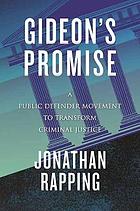
Gideon's Promise
A Public Defender Movement to Transform Criminal Justice
کتاب های مرتبط
- اطلاعات
- نقد و بررسی
- دیدگاه کاربران
نقد و بررسی

March 9, 2020
Rapping, a MacArthur “genius grant” recipient and former public defender, describes in this impressive debut the history and philosophy of Gideon’s Promise, his criminal justice reform organization. Named for Gideon v. Wainwright, the 1963 Supreme Court case establishing the constitutional right to counsel, Gideon’s Promise seeks to build a community of public defenders committed to “procedural justice,” “client-centered lawyering,” and the idea that people are more than “the sum total of their worst acts.” Rapping paints a bleak picture of the modern “conveyor belt” criminal justice system that creates impossible caseloads for public defenders, devalues the accused (80% of whom can’t afford to hire a lawyer), leans on plea bargaining under threat of unaffordable bail, and prioritizes lawyers’ relationships with judges over clients. To counteract these imbalances, Rapping trains lawyers to resist streamlining procedures that leave no time to collect information beyond police reports, adopt a narrative approach to “shape the universe of facts” at every step of the process, and commit to seeing their clients as people. He makes a convincing case that well-supported, values-based public defenders who prioritize incremental improvements in the face of systematic injustice can be effective change agents. This optimistic, well-articulated account is a must-read for policy makers and criminal-justice advocates.

March 15, 2020
An indictment of the U.S. criminal justice system, which treats the majority of defendants as ciphers--or worse. Rapping, a public defender who has received a MacArthur award for his pioneering work, explains how his career has led him to spearhead much-needed reforms. After struggling against recalcitrant judges, prosecutors, and even fellow public defenders in numerous jurisdictions, the author decided that the path to meaningful change for indigent defendants would need to come from public defenders themselves. Throughout the book, filled with detailed case studies of justice gone awry, Rapping describes the heavy caseloads and lack of funds with which most public defenders struggle, which means that their clients receive almost no attention. Rather than seeking courtroom trials for clients, besieged public defenders accept plea bargains for defendants without even exploring the possibility of an acquittal or a reduction of a prosecutor's charges. "The prosecution," writes the author, "has developed a formidable arsenal...to coerce people into giving up the protections at the heart of our justice system, and now only one in twenty Americans convicted of a crime even experience a trial." The method Rapping devised emphasizes a "client-centered defense," in which men and women represented by public defenders are more than just a case on paper and are "treated with dignity in the system." The approach morphed into an organization called Gideon's Promise, named for Gideon v. Wainwright, in which the Supreme Court ruled that the state must provide an attorney to those who cannot afford one. As Rapping documents, state legislatures, prosecutors, and judges have often resisted the intention of the court ruling, leading to countless travesties. Rapping tellingly quotes one judge who saw through the resistance: "While we all may not be able to agree on what justice looks like, surely we can agree on what injustice looks like." Useful reading for anyone interested in helping to change a deeply flawed system.
COPYRIGHT(2020) Kirkus Reviews, ALL RIGHTS RESERVED.

May 1, 2020
Former public defender and activist Rapping shares his vision for reforming America's dysfunctional criminal justice system, one public defender's office at a time. Rapping relates how he came to build his nonprofit organization, Gideon's Promise, which trains and supports ethical, client-centered public defenders, weaving together the story of his successes and setbacks with chilling anecdotes and statistics that provide a stark illustration of how our current system fails to protect impoverished defendants. In a carceral culture, constitutional rights become less important than maintaining the smooth processing of suspected criminals from arrest to guilty plea to prison. Without robust public defense offices, Rapping argues, we effectively condemn poor defendants to an inferior, and often flatly unconstitutional, justice system. Yet conversations about criminal justice reform often leave out the role of public defenders, while public defense offices are perpetually underfunded and face ardent resistance when defenders make a robust effort to protect their clients. Gideon's Promise acknowledges the road blocks to true justice for all Americans, but it also offers hope, optimism, and a road map for change.(Reprinted with permission of Booklist, copyright 2020, American Library Association.)

























دیدگاه کاربران